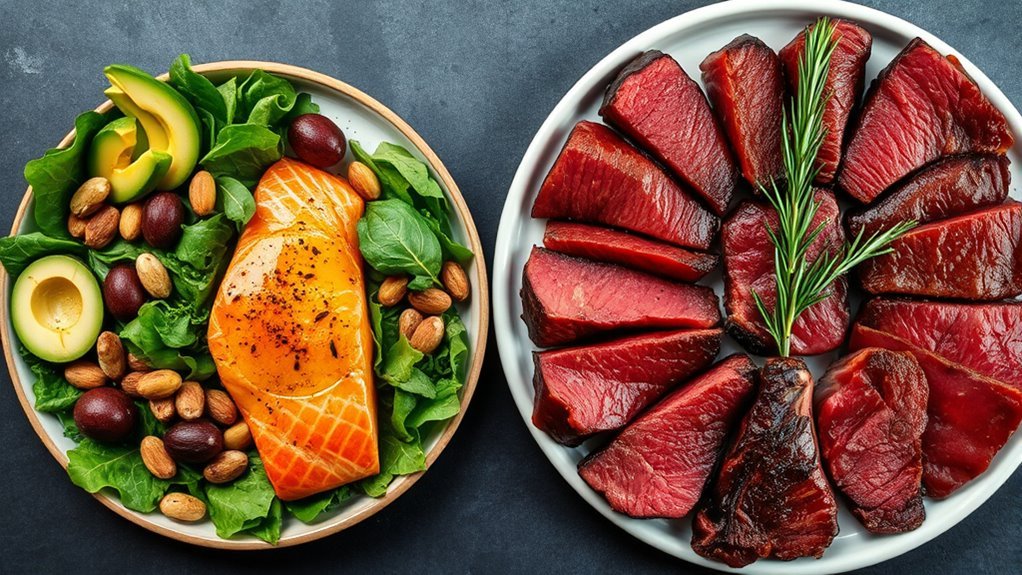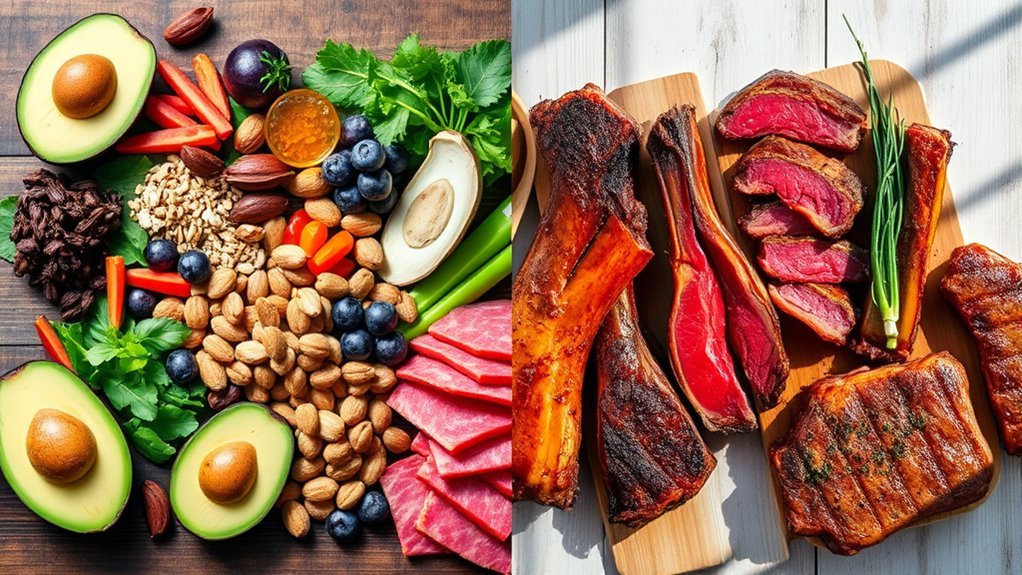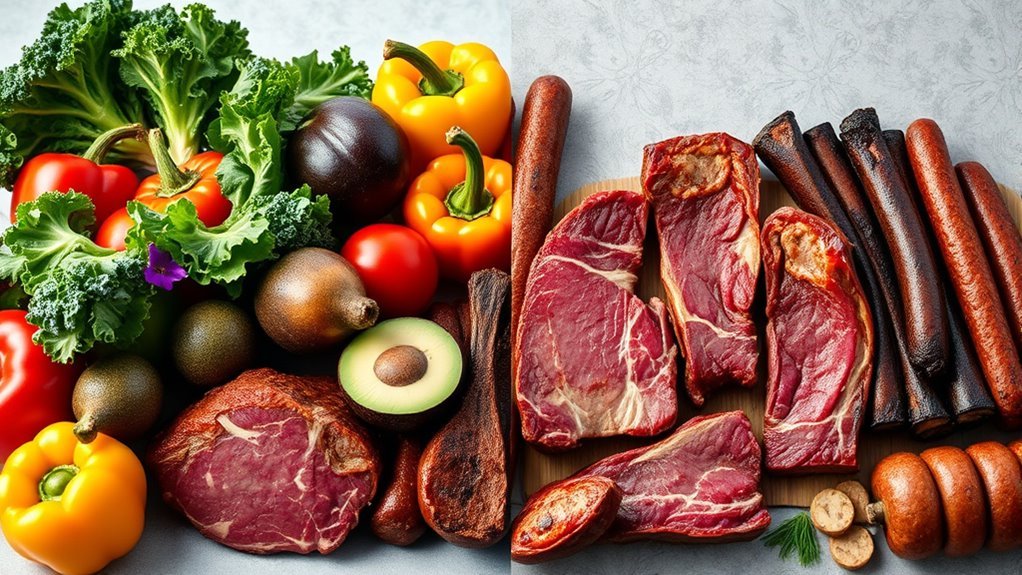The Keto diet prioritizes low carbohydrates while increasing fat intake to achieve ketosis, allowing low-carb vegetables for nutrients. In contrast, the Carnivore diet consists exclusively of animal products, mainly meat and fish, excluding all plant foods. While both diets can enhance energy and support weight management, they differ considerably in food choices and nutritional profiles. Understanding these differences can help you choose the best approach for your goals and lifestyle, leading to additional insights on their benefits and risks.
Overview of the Keto Diet

The ketogenic diet, often referred to as “keto,” is a low-carbohydrate, high-fat eating plan designed to shift your body into a state of ketosis. At its core, keto principles focus on drastically reducing carbohydrate intake while increasing fat consumption, prompting your body to burn fat for fuel. This metabolic shift can enhance energy levels, improve mental clarity, and support weight management. Effective meal planning is crucial for success on this diet; by prioritizing high-fat foods like avocados, nuts, and oils, you can easily meet your macronutrient goals. Incorporating low-carb vegetables guarantees you receive essential nutrients without exceeding your carb limit. Additionally, following the recommended macronutrient ratios ensures that your body remains in ketosis and maximizes fat-burning potential. Embracing these strategies allows you to enjoy the freedom of a satisfying, health-oriented lifestyle while reaping the benefits of ketosis.
Overview of the Carnivore Diet

The Carnivore Diet focuses exclusively on animal products, emphasizing meat, fish, and animal-derived foods while excluding all plant-based foods. You might find potential health benefits such as weight loss and improved metabolic markers, but it’s crucial to reflect on the associated risks and nutritional deficiencies. Understanding these dietary principles and their implications can help you make informed choices about your nutritional approach.
Dietary Principles Explained
While many diets emphasize a variety of food groups, the carnivore diet takes a radically different approach by focusing exclusively on animal products. This diet’s dietary principles center around the belief that consuming only meat can enhance nutrient absorption and simplify food choices.
Key components include:
- High Protein Intake: Primarily from meat, promoting muscle preservation.
- Low Carb Consumption: Minimal to no carbohydrates, which can lead to ketosis.
- Nutrient Density: Focus on organ meats to maximize micronutrient intake. Additionally, the carnivore diet can lead to increased mental clarity and a streamlined approach to meal preparation as it eliminates the need for diverse food options.
Potential Health Benefits
Adopting a carnivore diet may offer several potential health benefits that appeal to those seeking a simpler approach to nutrition. This diet emphasizes animal-based foods, which can lead to weight loss and improved metabolic health. Many followers report enhanced mental clarity and increased energy levels, potentially due to stable blood sugar levels. Additionally, the carnivore diet may aid in inflammation reduction, promoting better digestive health. It’s also linked to immune support and heart health through nutrient density.
| Benefit | Description | Evidence |
|---|---|---|
| Weight Loss | Reduces caloric intake | Study on fat loss |
| Mental Clarity | Improves cognitive function | Anecdotal reports |
| Inflammation Reduction | Lowers inflammatory markers | Clinical findings |
Risks and Considerations
Despite the potential benefits, there are notable risks and considerations associated with the carnivore diet that should not be overlooked.
- Nutritional Deficiencies: Relying solely on animal products may lead to deficiencies in essential vitamins and minerals, such as vitamin C and fiber.
- Long Term Sustainability: The restrictive nature of the diet can make it difficult to maintain over time, potentially leading to unhealthy eating patterns.
- Health Risks: High saturated fat intake may increase the risk of heart disease and other chronic conditions. Additionally, the high-fat nature of the diet can affect absorption of fat-soluble vitamins A, D, E, and K.
If you’re considering the carnivore diet, it’s crucial to weigh these concerns against its benefits. Consulting with a healthcare professional can help guarantee you’re making informed choices that align with your nutritional needs and lifestyle goals.
Key Differences in Food Choices

When comparing the keto and carnivore diets, it’s essential to understand their distinct food choices. The keto diet allows for a variety of low-carb foods, while the carnivore diet strictly focuses on animal products. This difference considerably impacts carbohydrate intake levels and the overall nutritional variety you can experience on each plan.
Allowed Food Groups
One of the key differences between the keto and carnivore diets lies in their allowed food groups, which greatly impacts dietary choices. While both diets emphasize low-carb options, their food restrictions vary considerably.
Allowed food groups include:
- Keto: Low-carb vegetables, nuts, and dairy products.
- Carnivore: Exclusively animal-based foods like meat, fish, and animal fats.
- Both: Focus on high-quality protein sources.
The keto diet allows for a wider variety of foods, giving you more freedom to choose nutrient-dense options. In contrast, the carnivore diet limits your choices strictly to animal products, emphasizing simplicity. The focus on high fat, moderate protein, and low carbohydrate intake can help you align your dietary preferences with your health goals, making it easier to adhere to your chosen lifestyle.
Carbohydrate Intake Levels
Understanding the differences in carbohydrate intake levels is essential for grasping how the keto and carnivore diets impact your body. The keto diet typically allows for a moderate intake of carbohydrates, primarily from low-carb vegetable sources and certain nuts, aiming for about 20-50 grams per day. This approach emphasizes complex carbohydrate types to maintain ketosis. In contrast, the carnivore diet eliminates carbohydrates almost entirely, focusing exclusively on animal-based foods. As a result, your carbohydrate sources are drastically limited, which may lead to a more significant reduction in insulin levels. This fundamental difference shapes not only your energy levels but also your overall health outcomes, allowing you to explore which dietary approach aligns with your personal freedom and lifestyle goals. Understanding your personal carb limits is crucial for successful adherence to the keto diet, ensuring that you stay in ketosis and achieve your health objectives.
Nutritional Variety Differences
While both the keto and carnivore diets offer unique approaches to nutrition, they differ markedly in the variety of foods you can consume. The keto diet allows for a broader range of food choices, which can enhance nutritional balance. In contrast, the carnivore diet imposes strict dietary restrictions, focusing exclusively on animal products.
Consider these key differences:
- Keto Diet: Includes healthy fats, low-carb vegetables, and dairy.
- Carnivore Diet: Consists solely of meat, fish, and animal-derived products.
- Nutritional Balance: Keto promotes a wider array of nutrients, while carnivore limits diversity. Additionally, the keto diet emphasizes macro tracking to maintain the right balance of fats, proteins, and carbohydrates.
Ultimately, your choice may depend on how much variety you desire in your meals and how you prioritize nutritional balance amidst dietary restrictions.
Health Benefits of Each Diet
As you explore the health benefits of the keto and carnivore diets, it’s important to recognize that each approach offers unique advantages tailored to different dietary needs. The keto diet, rich in healthy fats, can lead to significant health improvements, including weight loss and improved metabolic markers. Studies suggest it may enhance cognitive function and reduce inflammation. Conversely, the carnivore diet, focused solely on animal products, has been associated with increased energy levels and simplified digestion, benefiting those with food sensitivities. Both diets exhibit diet effectiveness in promoting fat loss and metabolic health, but the choice depends on your personal goals and lifestyle. Ultimately, understanding these benefits can empower you to make a choice that aligns with your health aspirations. Additionally, both diets require careful consideration of nutritional balance to avoid potential deficiencies and ensure overall health.
Potential Drawbacks and Risks
Despite the notable benefits of both the keto and carnivore diets, potential drawbacks and risks warrant careful consideration. You should be aware of the following concerns:
Consider the potential drawbacks of keto and carnivore diets, including nutritional deficiencies and social challenges.
- Nutritional deficiencies: Both diets can limit essential nutrients, especially if not carefully planned.
- Digestive issues: High-fat and low-fiber meals may cause gastrointestinal discomfort for some individuals.
- Social challenges: Adhering to these diets can complicate social interactions and eating out.
Additionally, long-term sustainability can be difficult, as individual variations in metabolic response may affect mental health and overall well-being. While these diets might work for some, it’s vital to assess the potential risks and adapt accordingly to maintain a balanced approach to nutrition. The risk of nutritional deficiencies can be mitigated by prioritizing a varied diet and consulting healthcare professionals for guidance.
Choosing the Right Diet for You
How do you determine which diet is best suited for your lifestyle and health goals? First, consider your dietary preferences and personal goals. If you have specific health conditions, understanding how each diet impacts them is essential. Think about lifestyle factors, such as your daily routine and how much time you can dedicate to meal planning. Long-term sustainability is important; choose a diet you can maintain without feeling restricted. Taste preferences also play a significant role, as enjoying your meals enhances adherence. Finally, consider social situations—how will your diet fit in with gatherings or dining out? By evaluating these factors, you can find a diet that aligns with your values and supports your journey towards better health. Additionally, be aware that the keto diet can lead to improved health markers when done correctly.
Frequently Asked Questions
Can I Drink Alcohol on Keto or Carnivore Diets?
You can drink alcohol on both keto and carnivore diets, but you’ll need to choose wisely. Low-carb options like dry wines and spirits can fit into your plan, while sugary cocktails should be avoided. In social situations, sticking to these alcohol choices helps maintain your dietary goals. Remember, moderation is key; excessive drinking can hinder your progress. Always be mindful of your body’s response and adjust accordingly to stay on track.
How Do I Transition From Keto to Carnivore?
Shifting from keto to carnivore is like sailing from a familiar shore into uncharted waters. Start by simplifying your meal planning; focus on high-quality animal products like meat, fish, and eggs, and gradually reduce low-carb vegetables and dairy. Embrace the freedom of fewer food varieties, allowing your body to adapt. Monitor how you feel and adjust accordingly, ensuring you’re getting essential nutrients. This journey can lead to improved energy and mental clarity if done mindfully.
Are Supplements Necessary on Either Diet?
Supplements aren’t strictly necessary on either diet, but they can help guarantee nutrient balance. If you’re concerned about deficiencies, consider supplement types like magnesium, potassium, or omega-3 fatty acids, especially on a carnivore diet. It’s essential to monitor how you feel and adjust your intake accordingly. Most importantly, listen to your body and choose supplements that align with your health goals, allowing you the freedom to thrive on your chosen diet.
What Are Common Mistakes to Avoid With These Diets?
Avoiding common mistakes on these diets is like steering clear of quicksand—you might not realize you’re sinking until it’s too late. Focus on meal planning to guarantee you’re getting a proper nutrient balance. Don’t rely solely on meat or fat sources; variety’s key for long-term success. Also, be cautious with portion sizes and make sure you’re staying hydrated. Keep track of your body’s responses to adjust your approach and maintain your freedom in food choices.
Can These Diets Affect Athletic Performance?
Yes, both diets can affect athletic performance in different ways. On keto, you might experience improved endurance due to fat adaptation, making it easier to sustain energy during long workouts. However, you may initially struggle with high-intensity activities. The carnivore diet can enhance strength by providing high protein levels, supporting muscle recovery and growth. Ultimately, it’s essential to listen to your body and adjust your nutrition based on your specific athletic goals.
References
- https://www.healthline.com/nutrition/keto-diet-vs-carnivore-diet
- https://www.ncbi.nlm.nih.gov/pmc/articles/PMC6077065/
- https://www.ncbi.nlm.nih.gov/pmc/articles/PMC8353702/
- https://www.washingtonpost.com/lifestyle/wellness/carnivore-diet-keto/2021/07/20/3a1a0d82-d7ad-11eb-8c4a-b5a1607d3e6e_story.html
- https://www.verywellfit.com/keto-vs-carnivore-diet-5197637
- https://www.clevelandclinic.org/health/articles/what-is-the-carnivore-diet
- https://www.cdc.gov/healthyweight/healthy_eating/index.html


